Unit 2-The Boy and the Bank Officer
Unit 2 The boy and the bank officer教案资料

Theme of the story:Traditionally, poor people and people who sympathize with them have regarded banks as evil, as enemies of the poor. Such suspicions and misgivings obviously still linger on. This article seems to prove that prejudices of people like the author are ungrounded.
1.He had come open a checking account. (Para.2) 2.Because the bank officer said that ,’a fourteenyear-old is not allowed to withdraw money without a letter from his parents.’( Para.7 ) 3. He was a fortyish black man with short, pressed hair, a pencil mustache, and a neatly pressed brown suit. No, he didn’t. Because everything about him suggested a carefully dressed authority. (Para.3) 4. Why did you let him withdraw money before, but not now?’ (Para.20) 5. Because they are protecting the boy’s interests.
unit2 the boy and the bank text

more than …
2. more than + n./ gerund: not just, not only • 她不只是教师,她还是我们的朋友。
– She is more than a teacher to us, she is our friend.
• 冬眠不仅仅是睡眠。 – Hibernation is more than sleep.
Theme Structure
Character Analysis
Detailed Analysis
Text Analysis
Text Analysis
Theme
• Banks are not necessarily “evil”. • Prejudice makes people embarrass themselves. • Unkind deeds may come from a heart that is
Subjunctive Mood
• 与现在/将来事实相反
– If he were here, things would be different.
• 与过去事实相反
– If I had listened to you, I would have finished my assignment.
• 与将来事实相反
years, he turned to freelance writing.
Many of his articles have appeared in the New
Yorker, Reader’s Digest and New York Times .
This text is taken from Strategies for Successful
精读1》第二课theboyandthebankofficer

His Life
W T
B R
Background
A Culture Tip
The Beginning of Banking Banks first emerged in the Middle Ages when people grew tired of carrying around all their gold and began leaving their money with the goldsmith. Until the founding of the Bank of England in 1694, England's goldsmiths were its first bankers. They kept money and other valuables in safe custody for their customers. They also dealt in gold bullion and foreign exchange. They profited from acquiring and sorting coins of all kinds. To attract coins, the smiths were willing to pay interest.
W T B R
Warming up
Check-on Preview
• Fill each blank with one word from the list and find the corresponding explanation.
1. 2. 3. 4. 5. I have a friend who hates banks with a special ___ . …he replied in a voice rising slightly in ___ . You ought to get your parents here and ___ . You know, you really shouldn’t have ___ . I couldn’t believe what this ___ was saying.
The Boy and the Bank Officer
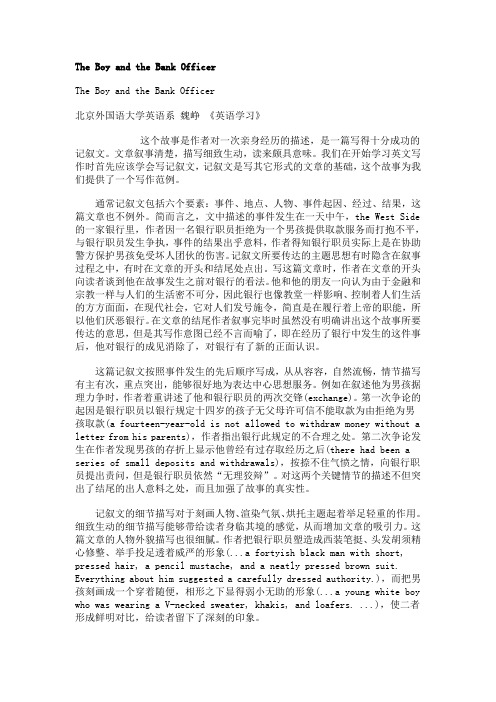
The Boy and the Bank OfficerThe Boy and the Bank Officer北京外国语大学英语系魏峥《英语学习》这个故事是作者对一次亲身经历的描述,是一篇写得十分成功的记叙文。
文章叙事清楚,描写细致生动,读来颇具意味。
我们在开始学习英文写作时首先应该学会写记叙文,记叙文是写其它形式的文章的基础,这个故事为我们提供了一个写作范例。
通常记叙文包括六个要素:事件、地点、人物、事件起因、经过、结果,这篇文章也不例外。
简而言之,文中描述的事件发生在一天中午,the West Side 的一家银行里,作者因一名银行职员拒绝为一个男孩提供取款服务而打抱不平,与银行职员发生争执,事件的结果出乎意料,作者得知银行职员实际上是在协助警方保护男孩免受坏人团伙的伤害。
记叙文所要传达的主题思想有时隐含在叙事过程之中,有时在文章的开头和结尾处点出。
写这篇文章时,作者在文章的开头向读者谈到他在故事发生之前对银行的看法。
他和他的朋友一向认为由于金融和宗教一样与人们的生活密不可分,因此银行也像教堂一样影响、控制着人们生活的方方面面,在现代社会,它对人们发号施令,简直是在履行着上帝的职能,所以他们厌恶银行。
在文章的结尾作者叙事完毕时虽然没有明确讲出这个故事所要传达的意思,但是其写作意图已经不言而喻了,即在经历了银行中发生的这件事后,他对银行的成见消除了,对银行有了新的正面认识。
这篇记叙文按照事件发生的先后顺序写成,从从容容,自然流畅,情节描写有主有次,重点突出,能够很好地为表达中心思想服务。
例如在叙述他为男孩据理力争时,作者着重讲述了他和银行职员的两次交锋(exchange)。
第一次争论的起因是银行职员以银行规定十四岁的孩子无父母许可信不能取款为由拒绝为男孩取款(a fourteen-year-old is not allowed to withdraw money without a letter from his parents),作者指出银行此规定的不合理之处。
The Boy and the Bank Officer
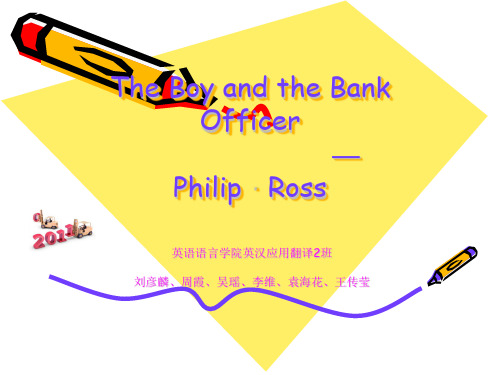
6.“But
Thanks! Bye!
5.…a
fourteen-year-old is not allowed to withdraw money without a letter from his parents. a-14-year-old: someone who is 14 years old. 使用这种形式时要注意,中间的名词要用单数,并且, 这种形式表示“adj.”。
• *press
n. 报刊,杂志(the press),记者 verb. 推、挤,劝说,要求,弄平 pressed brown suit: make cloths smooth using a hot iron. fortyish: about forty
3. Every thing about him suggested a carefully dressed authority. to suggest sth./that : to put sth. in sb’ s mind 使人想到 e.g. His name suggests that he was born in an Italian family. suggest sb to do sth suggest that sb should do sth
• 2. …the only officer on duty was a fortyish black man with short, pressed hair, a pencil mustache, and a neatly pressed brown suit. Pressed hair: make the hair uncurled. “”pressed 是过去分词作定语,修饰”hair”,意 思是把卷曲的头发拉直
现代大学英语精读_the_boy_and_bank_officer
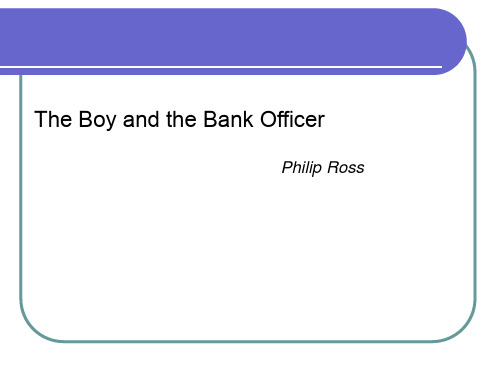
overuse
使用过度
overdrink
饮酒过甚
overeat
吃得过多
overharge
索价太高
over- (2): above; across;
beyond
overbridge 跨线桥;天桥
overcoat
外套;外衣
overshoe
套鞋
1.开户头 2. 结清账户
3.存款
4. 提款
5.透支 6. 节余
7.信用卡 8. 存折
9.银行卡 10. 存折
11.定期存款 12.活期存款
13.银行职员 14.银行出纳
15.自动提款机
12. a checking/current account 14. bank teller
15. A.T.M. (automatic teller machine)
Clerk: Please sign your name on the back of the check. All right. Here’s your passbook and your pass card. This passbook is for your own record. Bring the pass card with you every time you come to deposit or withdraw money. It also allows you to bank by computer during non-banking hours.
Philip Ross (1939— ) is an American writer based in New York. After working as a newspaper reporter for four years, he turned to freelance (自由职业作家) writing. Many of his articles have appeared in the New Yorker (《纽约人》), Reader’s Digest (《读者文摘》) and New York Times (《纽约时 报》). This text is taken from Strategies for Successful Writing: A Rhetoric and Reader, 3rd edition published by Prentice Hall, Inc. in 1993 in Englewood Cliffs, New Jersey.
Unit-2-现代大学英语精读第一册The-Boy-and-the-Bank-Officer答案
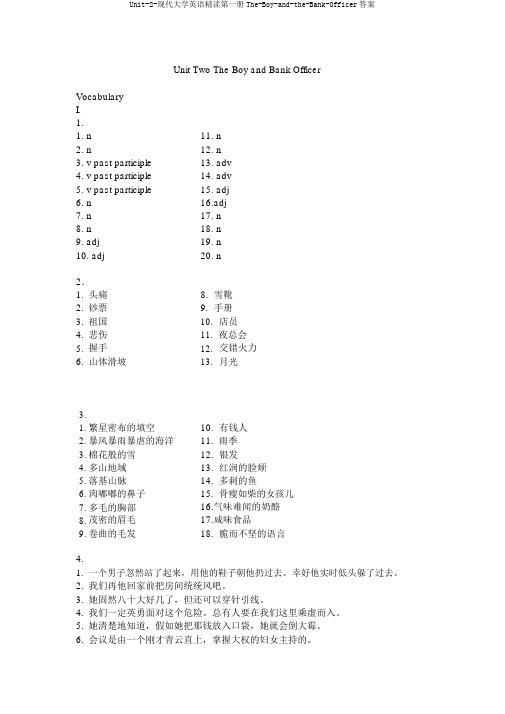
Unit Two The Boy and Bank OfficerVocabularyI.1.1. n11. n2. n12. n3. v past participle13. adv4. v past participle14. adv5. v past participle15. adj6. n16.adj7. n17. n8. n18. n9. adj19. n10. adj20. n2.1.头痛8.雪靴2.钞票9.手册3.祖国10.店员4.悲伤11.夜总会5.握手12.交错火力6.山体滑坡13.月光3.1.繁星密布的填空10.有钱人2.暴风暴雨暴虐的海洋11.雨季3.棉花般的雪12.银发4.多山地域13.红润的脸颊5.落基山脉14.多刺的鱼6.肉嘟嘟的鼻子15.骨瘦如柴的女孩儿7.多毛的胸部16.气味难闻的奶酪8.茂密的眉毛17.咸味食品9.卷曲的毛发18.脆而不坚的语言4.1.一个男子忽然站了起来,用他的鞋子朝他扔过去。
幸好他实时低头躲了过去。
2.我们再他回家前把房间统统风吧。
3.她固然八十大好几了,但还可以穿针引线。
4.我们一定英勇面对这个危险。
总有人要在我们这里乘虚而入。
5.她清楚地知道,假如她把那钱放入口袋,她就会倒大霉。
6.会议是由一个刚才青云直上,掌握大权的妇女主持的。
7.正如老话所说,剥猫皮能够有好多方法。
(不用故步自封)8.一对年青的恋人坠入爱河,仅由于此,他们被人们用石头活活砸死。
9.我希望贫富差距能够减小。
前两天我见到一个饿急了的年青人在一家饭馆里风卷残云地吃残羹剩饭。
10.桌子上的食品看起来是这样的诱人,我都流口水了。
2 Complete the following verb+ noun collocation or expressions.1.have/keep/open/close2.have/keep/ show/ lose3.attend/hold/chair/have/open/close4.change/read/speak5.give/hold6.make/send/save/pay/earn/deposit/withdraw/change/borrow/lend7.wear/show/give/use8.obey/follow/make/change/break9.have/spend/keep/waste/kill/save/count/lose10.protect/represent/considerplete the sentences by translating the Chinese in the brackets according to the sentence patterns in bold.1.is that we can’tfind enough foreign markets2.is that without democracy there is no harmonious society3.is that we should give/allow students more freedom4.is not strong enough to be her husband5.reliable enough to be her husband6.is not big enough to hold so many people7.There doesn’tseem to be any different opinion8.Because at that time there seemed to be enough food for everybody9.Because there didn’tseem to be any good reason at that time.10.because he was being followed at that time11.my car is being repaired/fixed12.I hear it is being criticized by many people13.a good doctor, but he doesn’tknow much about history14.an excellent English professor, but she doesn’tknow much about history15.we may be poor, but we are no beggars16.I shouldn’thave told her in such a hurry.17.I shouldn ’t have gone18.we should have listened to them.4. Fill in blanks with correct forms of the words and phrases listed below1. move in on, happened to 5. Because of, hand over2.aware of 6. the other day, on duty3.heard of7. on the case, as to4.think twice8. in the first place5. Fill in the blanks with the correct prepositions or adverbs.1. on 5. down upon2. into 6. up3. up7. up to4. forward to6. Translate the following sentences into English1.It seemed impossible to me, but all the others looked very confident2.We looked around. There wasn’t building standing in sight. The earthquakeseemed to have destroyed everything.3.–He seemed to be in low spirits these days. I wonder why.--I think it ’s because he doesn’tseem to be making much progress in his studies.He is afraid of being looked down upon by his classmates.4.–What are you looking for, Dick?--I seem to have lost my key. How annoying!5.If you find a word that does not seem to make any sense in the sentence, youshould look it up in the dictionary. That’s the only way to learn to use a word.6.They went on arguing for hours. Neither was willing to listen to the other. Isuddenly remembered someone saying“Discussion is an exchange ofknowledge while argument is an exchange of ignorance”7.The situation there seems to be very complicated. The government has promisedto look into it.8.My grandpa seems to be getting better and better, but he still needs somebodyto look after him.9.Economists have already come to the conclusion that the crisis seems to becoming to an end. World economy is looking up.10.When I got well I looked at my bank account. To my sadness, I found my balancewas almost zero. All my savings in the past three years were gone.7.Fill in each blank with correct form of the appropriate word in the brackets.Note that more than one word may be appropriate1.say, ago2.before, remember/recall3.spoke, say4.speak/tell, after, speak5.After, since6.bring/take, since/because (Use“bring”if she was coming to you, and “take”if shewas leaving you)7.question, since/when8.Remember, bring9.matter, problemGrammar1.Study the given patterns and rewrite the following sentences after the example.1.You ought to invite him to sing at the New Year Party2.You ought to do something a bit more challenging3.We ought to start preparing for celebration4.You ought to relax and stop worrying about him.5.If I knew their phone number, I would surely call them.6.If I was in charge here, I would help you.7.If I was offered the job, I would take it for sure.8.If I had a warm coast with me, I wouldn’tfeel so cold.9.If his parents could afford it, they would support him at college.10.Ted might be able to solve these problems if he were here with us.2.Rewrite the following sentences by using subjunctive mood after the example.1.Jack shouldn ’t have done that /thrown the exam paper to the floor.2.People shouldn’thave wasted waster like that.3.Joe shouldn’t have lied to his parents. / He shouldn’t have spent his parents’hard-earned money like that.4.I should not have given up so easily.5.I should not have jumped the queue. / He shouldn’thave behaved like that.6.Li Tong’s parents shouldn’thave read her private letter without her permission.7.I don’t think the students should have overacted. (They should have called thesecurity on campus)3.Fill in each blank of the passage with ONE suitable word.(1) types/kinds (5) pay (2) lending(6) opening(3) for(7) balance(4) is(8) store/keep/save/put4.Translate the following sentences using one of the patterns listed inGrammar exercises 1-2.1.You ought to try a different method.2.I think you ought to talk with our writing teacher about it.3.we ought to report the theft to the police immediately4.You ought to go and see your parents more often now that they are not ingood health.5.You shouldn’thave shouted at the elders like that6.You shouldn’thave been late for such an important meeting7.Isn’tJim your friend? You shouldn’thave turned down/rejected his offer of help.8.As a college students, you shouldn’t have spent all your free time playingcomputer games.9.If I failed this time, I would try for the second time.10.If global warming continued, these islands would disappear.11.If I had a million yuan, I would buy my parents an apartment12.If I were elected president of the students’union, I might organize a pianocompetition.5.Identify and correct the mistake (s) in each of the sentences.1.No one knew what had happened/ was happening there. No one knows what ishappening/has happened there.2.My parents had a good reason to be angry with me. I shouldn’thave lied to themin the first place.3.The new Prime Minister is well aware that his government is faced with a lot ofproblems./ The new Prime Minister is well aware of the problems hisgovernment is faced with.4.If you won the prize, what would you do with the money.5.The guest was greeted with a bunch of flowers at the airport.6.The teller was arguing with a young customer about something when thenarrator entered the bank.7.The narrator thought the bank’s policy was ridiculous。
Unit-2-The-Boy-and-the-Bank-Officer

Unit 2 The boy and the bank officerPhilips RossTeaching Objective1. Listening: news and dictation2. Speaking: My experience of opening an account in the bank3. Vocabulary:alternative, apparently, branch, bully, conclude, damn, dismay, fortyish, helpless, hopeful, idiot, interfere, irritation, loafer, mustache, neatly, overlit, passion, prep, rear, sandy, savings, series, shake, shrug, slightly, teller, withdrawal4. Grammar: subjunctive mood, model verbs5. Writing: College lifeⅠBackground Information1. Philip Ross (1939—)He is an American writer based in New York. After working as a newspaper reporter for four years, he turned to freelance (自由职业作家) writing. Many of his articles have appeared in the New Yorker (《纽约人》), Reader’s Digest (《读者文摘》) and New York Times (《纽约时报》). This text is taken from Strategies for Successful Writing: A Rhetoric and Reader, 3rd edition published by Prentice Hall, Inc. in 1993 in Englewood Cliffs, New Jersey.2. Functions of banksModern societies cannot do without banks. Banks keep, lend and issue money as well as offering many other financial services. They also help to regulate the economy with changes in interest rate and in money supply. However, traditionally, poor people and people who sympathize with them have regarded banks as evil, as enemies of the poor. Such suspicions and misgivings obviously still linger on. This article seems to prove that the prejudices of people like the author are ungrounded.Plot: a boy’s withdrawal of money from the bankSetting: at the bankProtagonist/Narrator: bank officer, the boy and “I”Theme of the story: Traditionally, poor people and people who sympathize with them have regarded banks as evil, as enemies of the poor. Such suspicions and misgivings obviously still linger on. This article seems to prove that prejudices of people like the author are ungrounded.ⅡWarm-up activities1. Did you ever misunderstand others? How did you deal with your misunderstanding?2. What do you think how banks keep surviving in the modern society?ⅢDetailed study of the textPara 11. passion---a strong feeling or emotionpassionate2. The only difference is that a bank’s goods happen to be money which is yours in the first place.goods---things produced in order to be soldhappen to be/do---to sth by chancee.g. I happened to be on the spot when the traffic accident occurred.3. If banks were required to sell wallets and money belts, they might act less like churches.church---it has certain associations. People usually think of a church as the spokesman of God, as a powerful organization that controls your life and can interfere in your life. Therefore the author thinks it is ridiculous for banks to act like churches.be subjunctiveif …did, …would/might doe.g. If I were you, I would not be here.If it rained tomorrow, we would have to stay at home.Para 24. the other day---recently, several days ago5. overlit---too brightover-, overeat, oversleep6. branch office7. open an account, close an account, settle an accountPara 38. fortyish---about forty---ish---approximately9. pressed hair---a hair style, with the hair straightenedthe black---curl hair10. Everything about him suggested a carefully dressed authority.Everything about him---his clothes, his manner, etc indicated that he was a carefully dressed man who had an important position and who exercised power.Para 411. be aware of---be aware thatbe sure of---be sure that12. a kid from a prep school---a kid from a preparatory schoolPara 513. hold one’s attention---keep one’s attentionpay attention to, distract attention fromPara 614. wear an expression of open dismay---look very worried, disappointed and upsetPara 717. a fourteen year old is not allowed to withdraw moneyallow sb to do stha fourteen-year-old person is too young to take money out of his accountPara 815. “But that doesn’t seem fair”, the boy said, his voice breaking.his voice breaking---with his voice breakingthat doesn’t seem fair, is not as stro ng as that is not fairPara 916. Now if you will excuse meIt is used when one wants to go back to one’s work, or to attend to other customers, or just to end the conversation.Para 1117. I didn’t think twice.I didn’t think very carefully; I said without hesitationPara 1218. Excuse me?---It is used when you disagree with somebody but still want to be polite about it. It means “But why? I don’t understand.”Para 1319. enough20. as to---about21. so-called---used when you think the name given is wrong or improperPara 1422. …in a voice rising slightly in irritation……in a little louder voice which showed that the man was a little annoyed an impatient…23. …I have no other alternative but to follow the rules. alternative---choice…I can’t do it in any other way. There is nothing else I can do.Para 1524. during this exchange---during this exchange of words/during this argument25. a balance of about $100balance---referring to the amount of money one has in one’s bank accountPara 1626. I had my opening.I found a good chance to do or to say something.Para 1927. I moved in for the kill.I began to prepare to kill, destroy or defeat my enemy.Para 2028. How do you explain that?Whan can you say to support this ridiculous logic?29. I zeroed in on the officer.zero in on sb---aim a gun at a targetexaggeration, hyperbolePara 2530. Well, it damn well seemed to me then…damn well---used to emphasize how sure or determined on is about somethingIt is slang and you should not use it in polite society.Para31. inform sb of (doing) sth32. bully---a person who uses his strength or power to frighten or hurt someone who is weaker33. …has been shaking the boy down……has been getting money from the boy by using t hreats.… the boy has been forced to give him money.34. hand it over---give it to that bully35. scared---frightened36. Anyway, the police are on the case.Anyway, the police are working on the case.Para 3237. Not that I ever heard of.I’ve ne ver heard of such a rule.ⅣStructure analysisPart One: (paras 1) The unfavorable opinion of the narrator’s friend on banks.Part Two: (paras 2-32) The narrator’s experience at a West Side bank in New York at lunchtime.ⅤExercises。
Unit2 The Boy and the Bank Officer

《综合英语1》
教案
授课班级:2018级2、3班
授课专业:外国语言文学类
授课学年学期:2018-2019学年上期教师姓名:白美娴
教务处评估处2017年12月制
说明:
1.一次课应备一个教案,每个教案根据实际情况在“课时”一栏中选择相应课时;2.教学目标包括:专业知识、专业能力、基本素养、职业素养、创新创业素养等;3.教学过程(设计)包括:(1)教学任务分配:教师讲授内容(含学科前沿知识)、学生自学内容、教师指导内容;(2)教学过程:复习导入、新课讲授、小结和教学反思;4.作为本课程的第一个教案,“参考教材、参考书目、参考文献”据实填写,以后教案视情况填写或填写“同前”。
the boy and the bank officer银行对话,填空练习2
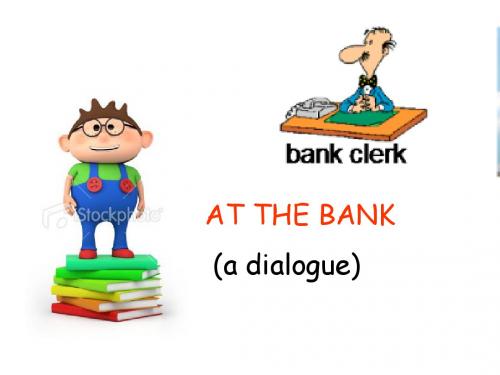
Checking To bank To open an account To show withdrawal
Pleasure To deposit To open the account To sign
AT THE BANK CLERK: May I help you?
TAYLOR: Yes, please. I’d like to_(1)_. CLERK: Yes, sir. Do you want a checking account or a savings account? TAYLOR: I’m not sure; what are the differences? CLERK: Well, If you open a _ (2)_ account, the interest rate(利率)is higher. But if you open a __(3)__ account, you may __(4)__ the money at any time. All you need is to __(5)__ your bank card and _(6)__ slip(纸条). TAYLOR: I’d rather open a checking account . CLERK: Good. Now please _(7)__ this application form. TAYLOR: Here you are. Is everything all right? CLERK: Yes, sir. But you have to _(8)_ some money at the same time as you_(9)_. TAYLOR: Fine. Here is fifty pounds. CLERK: Good. Please_(10)_ me your passport(护照). TAYLOR: Here you are. CLERK: Good.Please_(11)_ here. OK, everything is done. Here is your receipt and passport. I’ll mail you the _(12)_ in a week. And you can also _(13)___ by computer whenever necessary. TAYLOR: Thank you very much. CLERK: It’s my _(14)_.
Unit 2 The Boy and the Bank Officer Key to Exercises
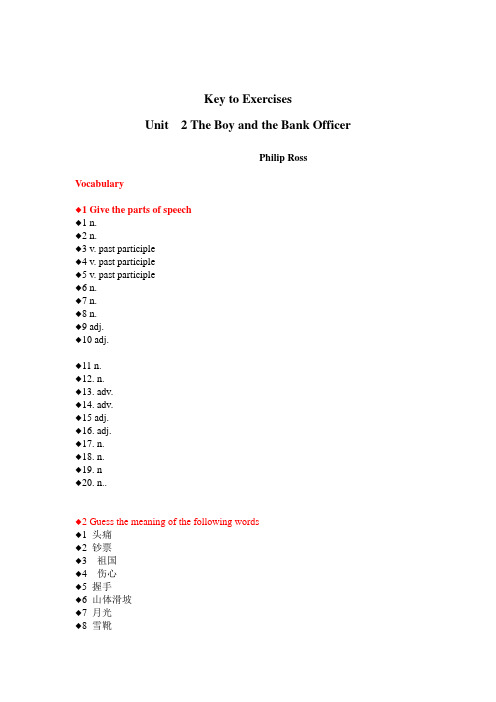
Key to ExercisesUnit 2 The Boy and the Bank OfficerPhilip Ross Vocabulary◆1 Give the parts of speech◆1 n.◆2 n.◆3 v. past participle◆4 v. past participle◆5 v. past participle◆6 n.◆7 n.◆8 n.◆9 adj.◆10 adj.◆11 n.◆12. n.◆13. adv.◆14. adv.◆15 adj.◆16. adj.◆17. n.◆18. n.◆19. n◆20. n..◆2 Guess the meaning of the following words◆1 头痛◆2 钞票◆3 祖国◆4 伤心◆5 握手◆6 山体滑坡◆7 月光◆8 雪靴◆9 手册◆10 店员◆11 夜总会◆12 交叉火力◆13 意志力◆3 Translate the following expressions◆1 繁星密布的夜晚◆2 狂风暴雨肆虐的大海◆3 棉花般的雪◆4 多山地区◆5 落基山脉◆6 肉嘟嘟的鼻子/蒜头鼻/ 大鼻子◆7 多毛的胸部◆8 浓密的眉毛◆9 卷曲的头发/卷发◆10 有钱人◆11 雨季◆12银发◆13 红润的面颊◆14 多刺的鱼◆15 瘦骨嶙峋的女孩◆16 气味难闻的奶酪◆17 咸味食品◆18 华而不实的语言◆4 Translate the following expressions◆1 及时低头躲了过去◆2 把房间通通风◆3 穿针引线◆4 勇敢面对这个危险。
浑水摸鱼◆5把钱放进口袋,她会倒大霉◆6掌握大权的妇女主持的,平步青云◆7 正如老话所说, 剥猫皮可以有很多办法。
(不必墨守成规) ◆8 被石头活活砸死◆9 狼吞虎咽地吃残羹剩饭◆10 流口水2◆1 have/keep/open/ close◆2 have/keep/show/lose◆3 attend/hold/ chair/ have/ open/ close◆4 change/read/speak◆5 give/hold◆6 make/send/save/pay/earn/deposit/withdraw/change/borrow/lend◆7 wear/show/give/use◆8 obey/ follow/ make/ change/ break◆9 have/ spend/ keep/ waste/ kill/ save/ count/ lose◆10 protect/ represent/ consider3◆1 is that we can’t find enough foreign markets◆2 is that without democracy there is no harmonious society.◆3 is that we should give/allow students more freedom◆4 is not strong enough to send him to prison◆5 reliable enough to be her husband◆6 is not big enough to hold so many people◆7 There doesn’t seem to be any different opinion◆8 because at that time there seemed to be enough food for everybody ◆9 because there di dn’t seem to be any good reason at that time◆10 because he was being followed at that time◆11 my car is being repaired/fixed◆12 I hear it is being criticized by many people◆13 a good doctor, but he doesn’t know much about history◆14 an excellent English professor, but she doesn’t know everything◆15 we may be poor, but we are no beggars◆16 I shouldn’t have told her in such a hurry◆17 I shouldn’t (have gone)◆18 we should have listened to them◆4 Fill in the blanks with the correct forms of the words and phrases ◆1 move in on, happened to◆2 aware of◆3 heard of◆4 think twice◆5 Because of, hand over◆6 the other day, on duty◆7 on the case, as to◆8 in the first place◆5. Fill in the blanks with the correct prepositions and adverbs.◆1 on◆2 into◆3 up◆5 down upon◆6 up◆7 up to◆look up◆rise in price上涨◆*The price of goods is looking up.物价正在上涨。
The_Boy_and_the_Bank_Officer综合英语1_课文原文
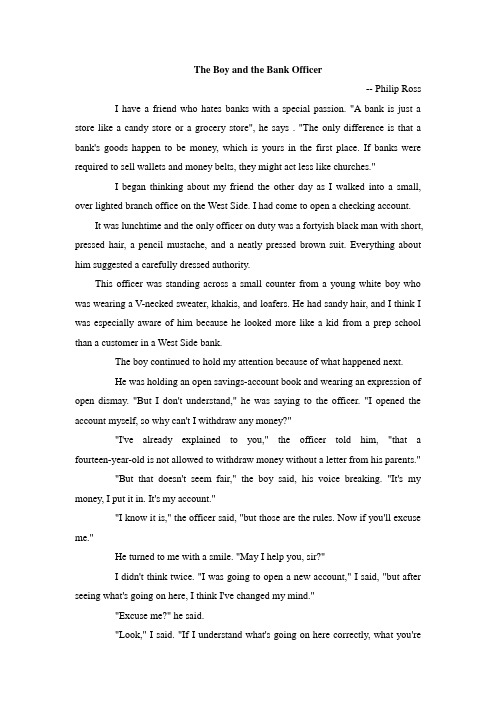
The Boy and the Bank Officer-- Philip RossI have a friend who hates banks with a special passion. "A bank is just a store like a candy store or a grocery store", he says . "The only difference is that a bank's goods happen to be money, which is yours in the first place. If banks were required to sell wallets and money belts, they might act less like churches."I began thinking about my friend the other day as I walked into a small, over lighted branch office on the West Side. I had come to open a checking account.It was lunchtime and the only officer on duty was a fortyish black man with short, pressed hair, a pencil mustache, and a neatly pressed brown suit. Everything about him suggested a carefully dressed authority.This officer was standing across a small counter from a young white boy who was wearing a V-necked sweater, khakis, and loafers. He had sandy hair, and I think I was especially aware of him because he looked more like a kid from a prep school than a customer in a West Side bank.The boy continued to hold my attention because of what happened next.He was holding an open savings-account book and wearing an expression of open dismay. "But I don't understand," he was saying to the officer. "I opened the account myself, so why can't I withdraw any money?""I've already explained to you," the officer told him, "that a fourteen-year-old is not allowed to withdraw money without a letter from his parents.""But that doesn't seem fair," the boy said, his voice breaking. "It's my money, I put it in. It's my account.""I know it is," the officer said, "but those are the rules. Now if you'll excuse me."He turned to me with a smile. "May I help you, sir?"I didn't think twice. "I was going to open a new account," I said, "but after seeing what's going on here, I think I've changed my mind.""Excuse me?" he said."Look," I said. "If I understand what's going on here correctly, what you'resaying is that this boy is old enough to deposit his money in your bank but he's not old enough to withdraw it. And since there doesn't seem to be any question as to whether it's his money or his account, the bank's so-called policy is clearly ridiculous.""It may seem ridiculous to you," he replied in a voice rising slightly in irritation, "but that is the bank's policy and I have no other choice but to follow the rules".The boy had stood hopefully next to me during this exchange, but now I was just as helpless. Suddenly I noticed that the open savings book he continued to grasp showed a balance of about $100. It also showed that there had been a series of small deposits and withdrawals.I had my opening."Have you withdrawn money before by yourself?" I asked the boy."Yes," he said.I moved in for the kill."How do you explain that?" I zeroed in on the officer. "Why did you let him withdraw money before, but not now?"He looked annoyed. "Because the tellers were not aware of his age before and now they are. It's really very simple".I turned to the boy with a shrug. "You're really getting cheated," I said. "You ought to get your parents to come in here and protest."The boy looked destroyed. Silently, he put his savings book in a rear-pocket and walked out of the bank.The officer turned to me. "You know," he said, "you really shouldn't have interfered.""Shouldn't have interfered?" I shouted. "Well, it damn well seemed to me that he needed someone to represent his interests.""Someone was representing his interests," he said softly."And who might that be?""The bank."I couldn't believe what this idiot was saying. "Look," I concluded, "we're justwasting each other's time. But maybe you'd like to explain exactly how the bank was representing that boy's interests?""Certainly," he said. "We were informed this morning that some neighborhood bully has been shaking this boy down for more than a month. The other guy was forcing him to take money out every week and hand it over. The poor kid was apparently too scared to tell anyone. That's the real reason he was so upset. He was afraid of what the other guy would do to him. Anyway, the police are on the case and they'll probably make an arrest today.""You mean there is no rule about being too young to withdraw money from a savings account?""Not that I ever heard of. Now, sir, what can we do for you?"Glossary:AlternativeApparentlyBranchBullyConcludeDamnDismayFortyishHelpless HopefullyIdiot savings teller shrugInterfereIrritationLoafer Mustache Neatly passion sandy series shake slightly OverlitProtest rearWithdrawal。
2-Unit-two-The-boy-and-the-bank-officer-教案
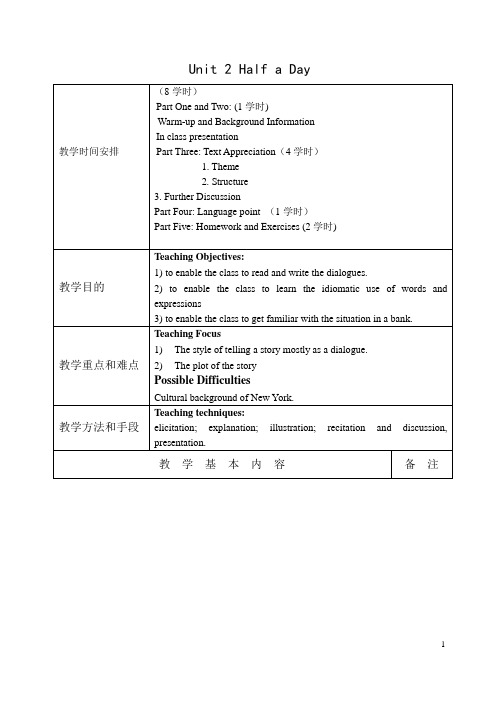
He thought the bank policy is very ridiculous. He thought what he saw confirmed his friend’s comment on banks. He decided not to open his account and found it a good chance to attack the bank policy.
He hates the bank.
A banker is a man who lends you un umbrella when the weather is fair and takes it away from you when it rains.
2. What can banks do for us? And what about churches?
2.Appreciation of the text:
Plot: a boy’s withdrawal of money from bank
Setting: at the bank
Main characters: the bank officer, the boy, “I”
Theme: traditionally, poor people and people who sympathize them regard bank as evil, or as enemy of the poor. Such suspicions and misgivings still linger on. This article seems to prove that prejudices of people like the author are ungrounded.
现代大学英语精读_the boy and bank officer

overfly
飞越
oversea(s) 海外的
overleap
跳过
overlook
俯视
over- (3): upset
overturn
overthrow
倾覆,倾倒 推翻
overset
翻转;翻倒
I. Words & Expressions
1.开户头 3.存款
2. 结清账户 4. 提款
I. Text Analysis
Structure of the text
Part 1 (para. 1) about: The attitude of the author’s friend toward bank.
Part 2 (paras. 2—23) about:The boy managed to withdraw money from the bank but was kindly refused.
Philip Ross (1939— ) is an American writer based in New York. After working as a newspaper reporter for four years, he turned to freelance (自由职业作家) writing. Many of his articles have appeared in the New Yorker (《纽约人》), Reader’s Digest (《读者文摘》) and New York Times (《纽约时 报》). This text is taken from Strategies for Successful Writing: A Rhetoric and Reader, 3rd edition published by Prentice Hall, Inc. in 1993 in Englewood Cliffs, New Jersey.
unit 2 voc---the boy and the bank officer

① interfere with: to prevent sth. from succeeding or from happening in the way that was planned Example: Anxiety can interfere with children’s performance at school.
8. interfere
1. sb interferes in a situation干涉;干预;介入。E.g. The
UN cannot interfere in the internal affairs of any country. 2. sth interferes with a situation妨碍;冲突;抵触。 E.g. Smoking and drinking interfere with your body's ability to process oxygen.
A checking account=a current account 活期账户
18.withdraw
v. a. to take money out of a bank account Example: Liz withdrew $100 from her account.
b. to remove sth. or take it away or take it back, often because of an official decision Example: She withdrew a document from her briefcase.
14. protest
Protest against 造句
申辩,申明 If you protest that something is the case, you insist
- 1、下载文档前请自行甄别文档内容的完整性,平台不提供额外的编辑、内容补充、找答案等附加服务。
- 2、"仅部分预览"的文档,不可在线预览部分如存在完整性等问题,可反馈申请退款(可完整预览的文档不适用该条件!)。
- 3、如文档侵犯您的权益,请联系客服反馈,我们会尽快为您处理(人工客服工作时间:9:00-18:30)。
The end of Gend to withdraw money from his own savings account. • The bank officer refused. • The reason was he was not old enough. • The root reason was that the officer tried to help the boy who was forced to give his money to some bad guys.
Cultural background
History of Banks
Banks first emerged in the Middle Ages when people grew tired of carrying around all their gold and began leaving their money with the goldsmith. The Medici family, one of the most prominent banking families in Europe during this time, became quite wealthy from its banking and money lending practices. This 14th-century painting depicts people depositing and withdrawing money in an Italian bank.
Background Information
I. II.
Author Cultural Background
About the Author
Philip Ross (1939— ) is an American writer based in New York. After working as a newspaper reporter for four years, he turned to freelance (自由职业作家) writing. Many of his articles have appeared in the
happen/occur/take place
happen
refers to accidental or unplanned event
occur
refers to accidental or unplanned event;
(more formal than happen)
take place
suggests that an event is/was planned
Text Appreciation
Structure of the text
The attitude of the author’s friend toward bank. Part 2 (paras. 2—23) about:The boy managed to withdraw money from the bank but was kindly refused.
Theme of the story
Text Appreciation
For reference.
Plot: a boy’s withdrawal of money from the bank
Setting: at the bank
Protagonists: bank officer, the boy and “I”
Lesson Two
The Boy and the Bank Officer
Contents
• • • • • Part Part Part Part Part One: Warm-up Two: Background Information Three: Text Appreciation Four: Language Study Five: Extension
Italian Banking in the 14th Century
Text Appreciation
Have you got the key elements in the story?
Plot of the story Setting of the story Protagonists of the story Writing techniques of the story
The end of Warm-up Questions.
“The only difference is that a bank’s goods happen to be money, which is yours in the first place.”(para.1)
• • • • happen to do sth. do sth. by chance 我正好懂些医学,所以你骗不了我。 I happen to know about medicine, so you can not fool me. • 那栋房子着火的时候,我碰巧从那经过。 • I happened to be passing by when the fire broke out.
happened
• in the first/second place
• used to introduce a series of points in an argument or to talk about what should have been done; firstly/secondly • 我没有去,首先是因为我没有时间,其 次… • I didn’t go because I didn’t have time in the first place.
To be continued on the next page.
A church is a place where religious people are given moral lessons. The author and his friend hate banks acting like churches because they think banks should simply give service and have no right to tell people what to do and what not to do.
Warm-up
What does bank mean to you?
(Brainstorming)
Words & Expressions
Guess the meaning of the following words. 1. open an account 3. deposit 5. overdraw 7. credit 9. pass card 11. a savings account 2. close an account 4. withdraw 6. balance 8. passbook 10. an account book 12. a current account
Functions of Banks
• 1. to keep, lend and issue money • 2. to offer many financial services • 3. to regulate the economy with changes in interest rate and in money supply
New Yorker (《纽约人》), Reader’s Digest (《读者文摘》) and New York Times (《纽约时报》). This text is taken from Strategies for Successful Writing: A Rhetoric and Reader, 3rd edition published by Prentice Hall, Inc. in 1993 in Englewood Cliffs, New Jersey.
If banks were required to sell wallets and money belts, they might act less like churches. (para. 1) Paraphrase Churches which usually control people’s life and can interfere in people’s life. So, the author thinks it is ridiculous for banks to act like churches.
The end of Author.
Cultural background
Banking
Ancient Mesopotamia • 1. Banking originated from ___________. • 2. At first money presented itself in the form of grain and ____________. other commodities _____ • 3. For safe-keeping, the valuable things were put palaces _____, temples and________. private houses in royal _______, receipts laws • 4. People used _______ for transfers and _____ were also made. • In Egypt too the centralization of harvests in state warehouses also led to the development of a system of banking.
